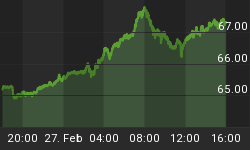
"I generally sleep pretty well...I have a lot to do during the day and I need to be well rested" ~ Ben Bernanke
Rock-a-bye baby, on the treetop,
When the wind blows, the cradle will rock,
When the bough breaks, the cradle will fall,
And down will come baby, cradle and all.
Why is a song about a severely injured baby and smashed cradle sung to children at night to lull them to sleep? Apparently, because If you sing this popular lullaby often enough the nonsensical violence in the storyline fades and the rhythmically appealing sounds endure.
A similar contradiction is apparent when it comes to central banks and quantitative easing (or money printing). Historically regarded as a desperate act that risked unleashing a currency collapse, money printing is not a vocation that central bankers usually aspire to. However, after years of experimenting with increasingly extravagant QE jingles, today money printing is the soothing melody that tucks investors in at night.
"Central banks have saved the day! - So why not keep printing anyway?"
The Specific Storylines
Assuming government procured inflation numbers remain tame, Bernanke and company are going to print and buy stuff until the U.S. unemployment rate drops to at least 6.5%. Ignoring the fact that savers are being crushed by these policies and no evidence exists that money printing can create jobs, this song sounds wonderful.
Next is the ECB, which unleashed the prospect of 'unlimited' (money printing) late last year. Due to unsustainable debt and anemic growth, bailouts and austerity are not about to go gently into the good night in euro-land. Nevertheless, 'unlimited' had a ring to it that all previous musical scores from the ECB since 2010 lacked. Suddenly, those parties speculating on sovereign default(s) have been lulled to sleep, and, as Sir Alan Greenspan recently put it, the 'tail risks' in the euro-zone crisis have been removed (the recent Cyprus kerfuffle notwithstanding).
Finally, there is Japan, where former and current Prime Minister, Shinzo Abe, pledged to use "unlimited easing" to get inflation running at 2%. To counter the fact that as Prime Minister he does not have his hand on the presses, Abe "threatened to take legislative action to force the bank's hand if it doesn't act on its own" (WSJ). In response to this aggression the Yen plummeted, the Nikkei soared, and fears of Japan's structural deflation and gargantuan debt-load ebbed...
Suffice to say, as the central banks in control of big three (the dollar, Euro, and Yen) vie to print first and worry about consequences later, this has helped raise central bank reserves to nearly $11 trillion, or "more than four times as much as global hedge funds" (FT). These massive and expanding reserves provide some assurances that your average financial crisis will not transpire. After all, how can any major asset class or systemically important financial entity collapse given the crazed print-first look in central banker's eyes?
But while today's print-fest provides an aura of safety for paper assets, it also has awakened concern of 'currency wars'.
Rock-a-bye baby, on the treetop
More than 4-years into zero percent territory and the Fed's balance sheet is still expanding to record highs ($3.189 trillion as of March 20, 2013). Bernanke confirmed last week that the Fed will continue to print, he isn't worried about a stock bubble, and, despite Cyprus, "At this point, we're not seeing a major risk to the U.S. financial system or the U.S. economy". With the Fed unable to anticipate the last two major financial calamities common sense says these trends are cause for alarm rather than applause. Unfortunately common sense is no match for the artificial glow of rising asset prices and falling interest rates...
Once today's euphoric hum of printing presses fades the injured babies and smashed cradles are sure to arrive. After all, the very idea that central banks can press print and solve economic and financial market problems is a baby on the treetop fairytale. But before the next calamity is triggered - before the real currency mayhem is unleashed - it is important to note that the growing cult of QE represents a worldwide currency union rather than war. Try as they might, central bankers do not yet have the right weaponry to attack the author of the Central Bank Lullaby.
Central bank' darlings, piling up the loot,
When all else fails they operate in cahoots,
When the delusions break, fiat will fall,
And down will central banks, asset prices and all















